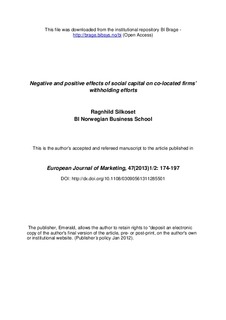| dc.contributor.author | Silkoset, Ragnhild | |
| dc.date.accessioned | 2013-02-11T12:00:48Z | |
| dc.date.available | 2013-02-11T12:00:48Z | |
| dc.date.issued | 2013 | |
| dc.identifier.issn | 1758-7123 | |
| dc.identifier.uri | http://hdl.handle.net/11250/93738 | |
| dc.description | This is the author’s accepted and refereed manuscript to the article | no_NO |
| dc.description.abstract | Purpose – This study aims to demonstrate that the investments in social capital do not always pay off. Although an important function of social capital is its potential for influencing co-located companies' opportunistic behavior, social capital also has a negative side. This study seeks to examine the negative and positive effects of the social capital dimensions on a company's profitability and on the perception that co-located firms free ride and shirk.
Design/methodology/approach – By including data from 224 firms in 112 true-paired dyadic relationships, this study provides a unique and valid basis for empirical study within SEM analysis. The ability to link different information sources in the analysis creates a unique data set that controls for the confounding effects of common method biases in the analysis.
Findings – Markets with a low degree of collective activity gain less advantage from cognitive social capital, because its primary effect lies in its transparency and ability to detect opportunistic behavior. The effect of relational social capital is more stable because of the positive direct effect on profitability. Structural social capital indicates markets that would benefit from creating private incentives with the intention to transfer collective activities into private payoffs. This reduces the need to follow up the co-localized businesses.
Originality/value – This study shows that the dimensions of social capital vary regarding whether they reduce or facilitate the perceived withholding efforts by co-located firms. | no_NO |
| dc.language.iso | eng | no_NO |
| dc.publisher | Emerald | no_NO |
| dc.subject | Empirical research | no_NO |
| dc.subject | Free riding | no_NO |
| dc.subject | Networks | no_NO |
| dc.subject | Organizational behaviour | no_NO |
| dc.subject | Paired-dyadic analysis | no_NO |
| dc.subject | Profit | no_NO |
| dc.subject | Shirking | no_NO |
| dc.subject | Social capital | no_NO |
| dc.title | Negative and positive effects of social capital on co-located firms’ withholding efforts | no_NO |
| dc.type | Journal article | no_NO |
| dc.type | Peer reviewed | no_NO |
| dc.source.pagenumber | 174-197 | no_NO |
| dc.source.volume | 47 | no_NO |
| dc.source.journal | European Journal of Marketing | no_NO |
| dc.source.issue | 1/2 | no_NO |
| dc.identifier.doi | 10.1108/03090561311285501 | |
